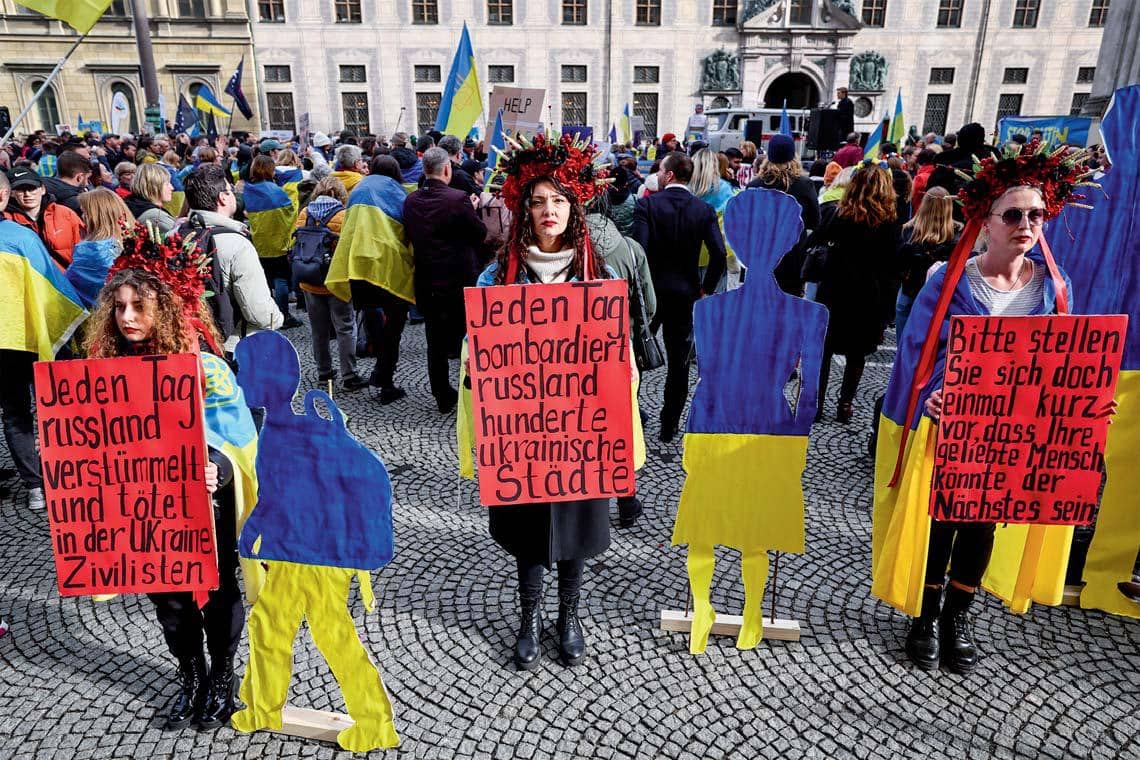Versuchen GOLD - Frei
Shadow Of Ukraine War Looms Over Security Conference
The Guardian Weekly
|February 23, 2024
On the top floor of Literaturhaus in Munich, the Ukrainian veteran Yuliia Paievska was asked to speak to the elite of the transatlantic security and political establishment, including Hillary Clinton and the Estonian prime minister, Kaja Kallas, as they lunched on a three-course meal, served with military precision.

"We are the dogs of war," Paievska said as she introduced herself, explaining how she had started out as a volunteer and then worked as the chief medic at a hospital on the frontline during the siege of Mari- upol. "I had children die in my hands, civilians, elderly. I do not know how you can forgive that. Thousands of soldiers have gone through my hands, thousands of civilians, streams of blood, rivers of suffering."
She had herself been captured, beaten and tortured, and said every day had been a psychological and physical humiliation. "War, you know, it drinks our blood. It is never satisfied with our blood. It is always hungry. The more you give, the more she wants. But we made a commitment to our people.
She haltingly ended with an appeal. "To stop the war, we need to kill the war. Give us weapons to murder the war. We will manage, just help us a little bit."
It was a moment when those at the Munich Security Conference, a meeting of western politicians, defensive officials and academics, sensed what was at stake. It rephrased the question that the Ukrainian president, Volodymyr Zelenskiy, had put to the conference. In phraseology reminiscent of President John F Kennedy, he had said: "Please don't ask Ukraine when the war will end. Ask yourself why Putin is still able to wage this war."
With Alexei Navalny dead, the Ukrainians retreated from Avdiivka, the US Congress deadlocked over supplying a further $60bn in aid and the shadow of Donald Trump's return to the White House hovering over any discussion, Zelenskiy's question could not have been more pertinent.
Diese Geschichte stammt aus der February 23, 2024-Ausgabe von The Guardian Weekly.
Abonnieren Sie Magzter GOLD, um auf Tausende kuratierter Premium-Geschichten und über 9.000 Zeitschriften und Zeitungen zuzugreifen.
Sie sind bereits Abonnent? Anmelden
WEITERE GESCHICHTEN VON The Guardian Weekly
The Guardian Weekly
My boyfriend's use of AI stops him thinking for himself
My boyfriend of eight years, who is 44, has ADHD and runs his own business.
2 mins
February 27, 2026

The Guardian Weekly
'Our land lets us all breathe clean oxygen'
The Congo River basin is home to a biodiverse ecosystem-and a relentless trade in timber and charcoal
3 mins
February 27, 2026

The Guardian Weekly
Nations apart: Andrew's UK arrest highlights US passivity on Epstein files
It is a tale of two nations.
2 mins
February 27, 2026

The Guardian Weekly
Under water: Engulfed by storms, but climate denial grows
In the week between Christmas and the New Year, two Spanish men in their early 50s - friends since childhood - went to a restaurant and did not come home.
3 mins
February 27, 2026

The Guardian Weekly
The crown in court
A brief history of royal run-ins with the law
3 mins
February 27, 2026

The Guardian Weekly
Big in Beijing
James Balmont's band, Swim Deep, plays to crowds of hundreds across the UK - but in China, they play to tens of thousands. And they're not the only ones
3 mins
February 27, 2026
The Guardian Weekly
Trump's Board of Peace is serving private interests more than public good
In Gaza, aid still trickles in at levels relief agencies say are far below what is required.
2 mins
February 27, 2026

The Guardian Weekly
Needle drops Weight-loss pills are here - and big pharma stands to gain
Oral tablets could bring obesity treatment into the mainstream, with the sector predicted to be worth $200bn by the end of the decade
6 mins
February 27, 2026

The Guardian Weekly
How Italians gradually warmed to their Winter Olympics
With the atmosphere in Rome subdued as the Winter Olympics unfolded across northern Italy, travelling to the Games was not on Amity Neumeister's radar.
3 mins
February 27, 2026

The Guardian Weekly
Fire and fury
Violence erupts as security forces kill feared cartel boss.
1 min
February 27, 2026
Listen
Translate
Change font size

